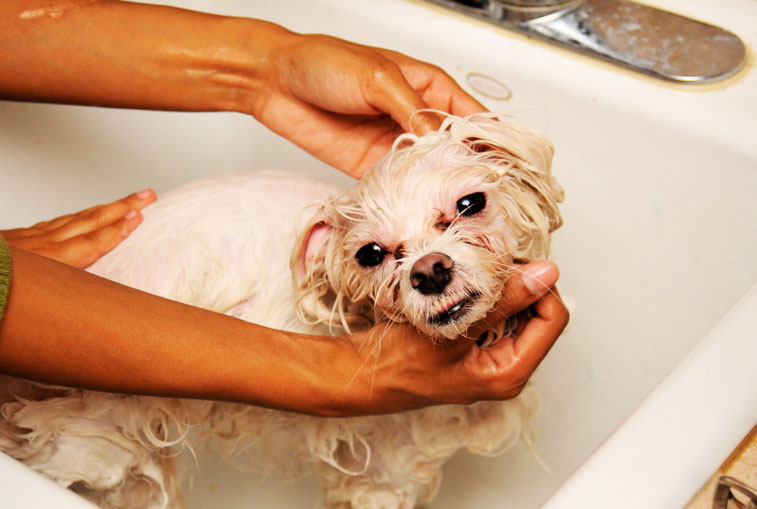
How Often Should You Wash Your Dog? Some people think they should only wash their dogs when they start to smell, while others may want to bathe their pet every month or so. Before you decide how often you should wash your dog, there are several factors to consider that will ultimately lead to the best decision on this matter, including your dog’s breed and health condition, as well as his environment and activity level.
Washing your dog may seem like a simple chore, but it can harm your dog’s health if you don’t do it the right way. Knowing how often to wash your dog and what products to use can be confusing, with so many options out there. But our experts have done the work for you! Here’s how often you should wash your dog, depending on their coat type, and how much time you want to spend on grooming every week.
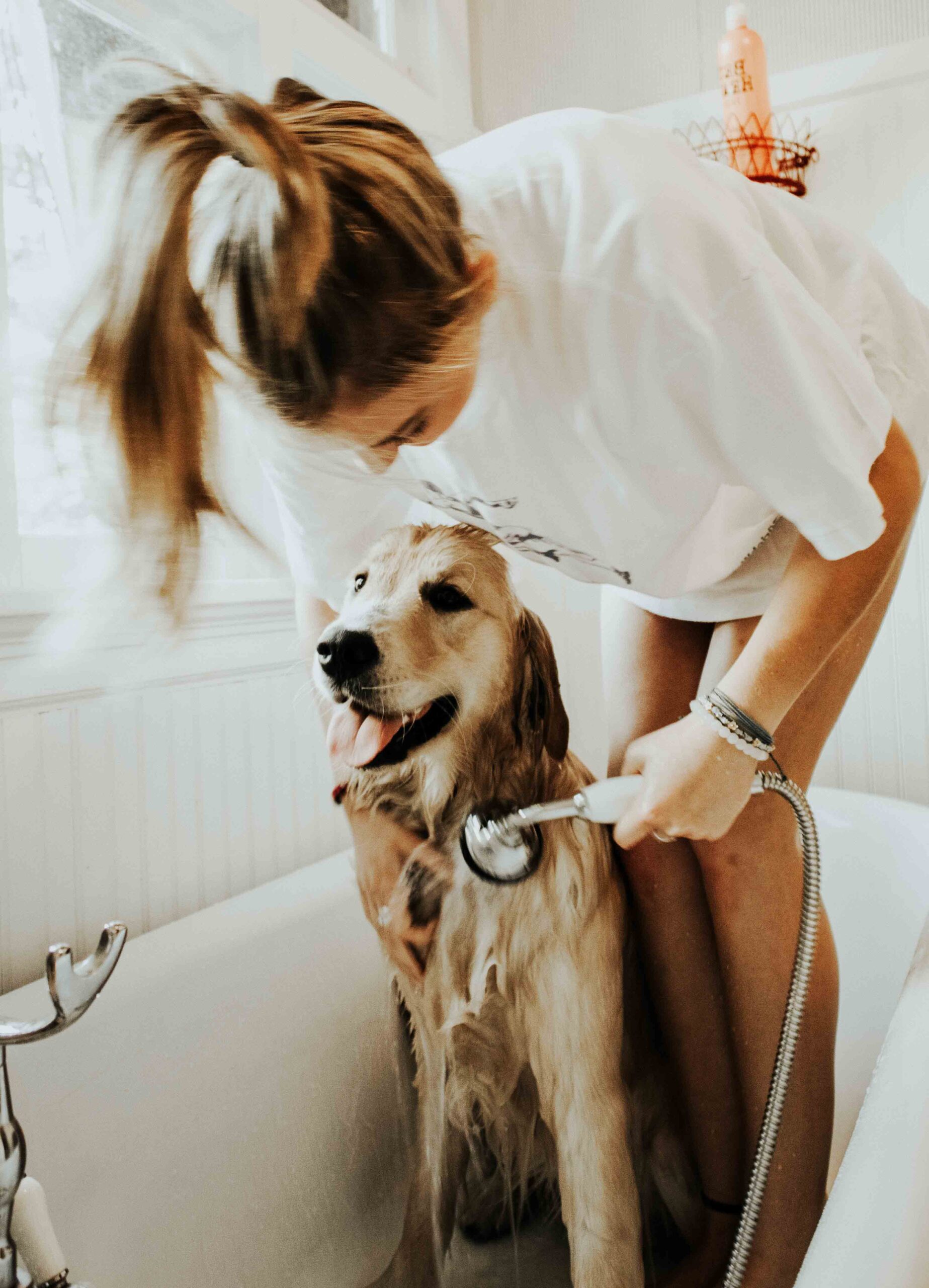
Bathing Your Puppy
Puppies are adorable, but they can carry a lot of dirt and bacteria around with them. Bathing a puppy too often can dry out their skin and can be potentially irritating. Still, at some point (usually about 8 weeks old), you should start bathing your puppy regularly to help prevent future health problems down the road. Depending on how dirty your puppy gets, one or two baths per month will do. Use warm water mixed with some dog shampoo; for spot-cleaning, use plain water.
Bathing an Older Dog
An older dog might not be as active or able to run around in the backyard as it used to. If that’s true for your pup, then don’t bathe them more than once a month. If you decide to clean them, choose a lukewarm temperature and be careful not to scrub too hard. Older dogs often have fragile skin and can be injured from harsh soaps and chemicals found in many shampoos. Over-drying can cause problems as well.
Can I bathe my dog in the morning?
It depends on your dog. If you have a breed of dogs that typically do not shed, such as a chihuahua or Yorkie, you should bathe them as needed (which is still every couple of weeks). If you have a breed that sheds – such as a Labrador or Border Collie – then it is important to bathe your dog at least once per week. Bathing more often than necessary will dry out their skin and hair coat. Plus, who wants to live in a home with stinky dogs? Wash them often!
Dog Shampoo for Dogs Work?
Washing your dog is a no-brainer, but does shampoo for dogs work? Some people are under the impression that it doesn’t, and you should just stick to water. They might be right.
Dogs don’t need to be bathed with shampoo as often as we do; all they need is a good scrubbing now and then. However, what they do require is something to keep their coat shiny and their skin healthy—and that’s where grooming products come in handy. If you want your dog to look his best (or if he has a particularly matted coat), consider using a dog shampoo or conditioner every few weeks or so.

Risks Associated with Frequent Washing
Several studies have noted an association between frequent washing and a higher risk of skin cancer in humans. In 2013, researchers published a paper in Cancer Epidemiology, Biomarkers & Prevention that found frequent hand-washing was linked to an increased risk of melanoma and basal cell carcinoma. The study suggests that daily washing can dry out your skin, causing irritation and sensitivity while stripping away the body’s natural protective barrier against harmful UV rays. When you regularly expose yourself to sunlight without enough protective barrier—i.e., when you frequently wash your hands—your skin is more susceptible to ultraviolet damage that could lead to cancerous cells forming.
Can I Wash My Puppy’s Ears?
Yes! There are several reasons why you might want to wash your puppy’s ears. A dirty ear canal is a breeding ground for yeast, bacteria, and mites that can cause infection, itching, and tearing. If your dog is experiencing any of these problems, it’s time to wash his ears with an ear cleaning solution and cotton balls or gauze pads.
Are Certain Breeds More Prone to Ear Infections?
Dogs of all ages and breeds can suffer from ear infections, although certain breeds are more prone to them. Usually caused by bacteria, fungal infection, or allergies, ear infections range in severity from uncomfortable to severe; if your dog is scratching its ears or shaking its head a lot, take it to a vet. In more mild cases, however, you may be able to treat your dog’s condition with home remedies like tea tree oil or aloe vera juice. Before treating an ear infection yourself, consult with your vet and let him know what treatment you plan on using so he can offer advice on dosage amounts and precautions.
Is Bathing Dangerous to Your Dog’s Ears?
How often you should bathe your dog depends on various factors, including where you live, how dirty your dog gets, and how much time you can commit to keeping them clean. The ASPCA recommends washing your dog once a month if he lives in an apartment with little exposure to dirt, grass, or water. If your puppy likes to play in creeks and swims in lakes, however, his bathing schedule might be closer to once every other week. If you’re wondering whether to dry or rinse ears after a bath, new research from North Carolina State University shows it’s best to air out dogs’ ears completely—so save that blow dryer for your hair.
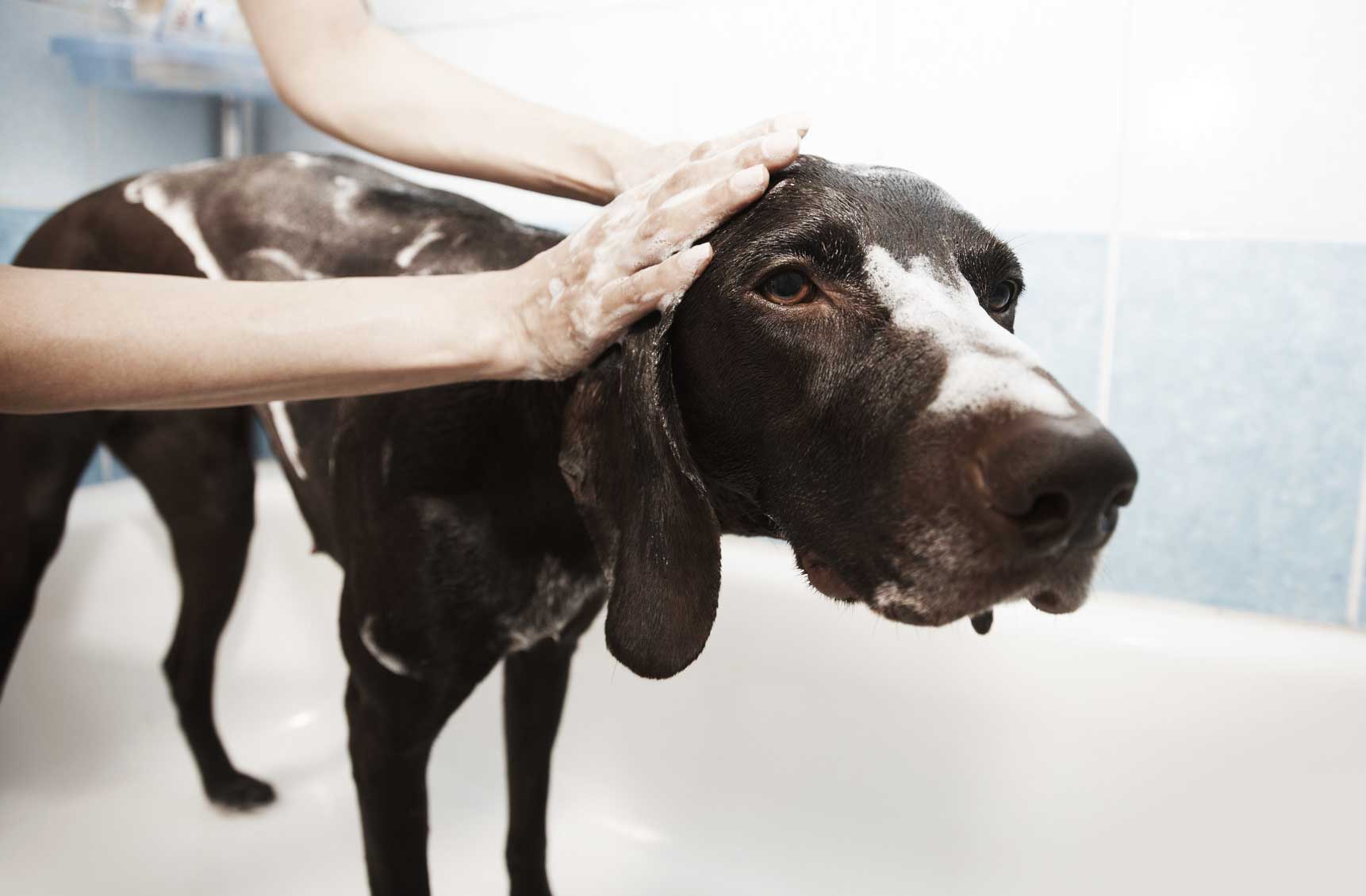
Getting Prepared For That First Bath
To prepare your dog for their first bath, all you need to do is get them used to water on their paws. You can either dip one of their feet in a sink or tub or spray some water from a distance. Whatever you choose, make sure that they don’t panic; if they feel comfortable and aren’t afraid of water, then they should be fine when it comes time for their first full bath. Make sure to keep your pup away from slippery surfaces like wet tiles and baths until they have mastered walking on wet floors.
Why Do People Wash Their Dogs?
People wash their dogs for various reasons, so it’s a little difficult to pinpoint one. One answer might be that some people do it because they feel guilty about it. They may have gotten a dog from an animal shelter and worry that, somehow, they don’t love their pet as much as they should because they haven’t taken enough time to groom them since adoption. Or perhaps they know their dog is dirty but don’t want to seem lazy by not taking care of them properly. So, as you can see, there are many reasons why someone would wash their dog—or any other pet for that matter! But what about how often is too often?
Can Dogs Get Sick From Washing Themselves?
Dogs are intelligent and resourceful creatures that like to keep themselves clean by licking, so it’s not likely your dog will get sick just from washing. However, contact your veterinarian immediately if you notice that your dog is scratching excessively or has watery eyes after their bath. They might be suffering from a type of allergy called atopy, which results in symptoms including excessive itching and rashes. The exact cause of atopy isn’t known, but it could be due to food or dust mites.
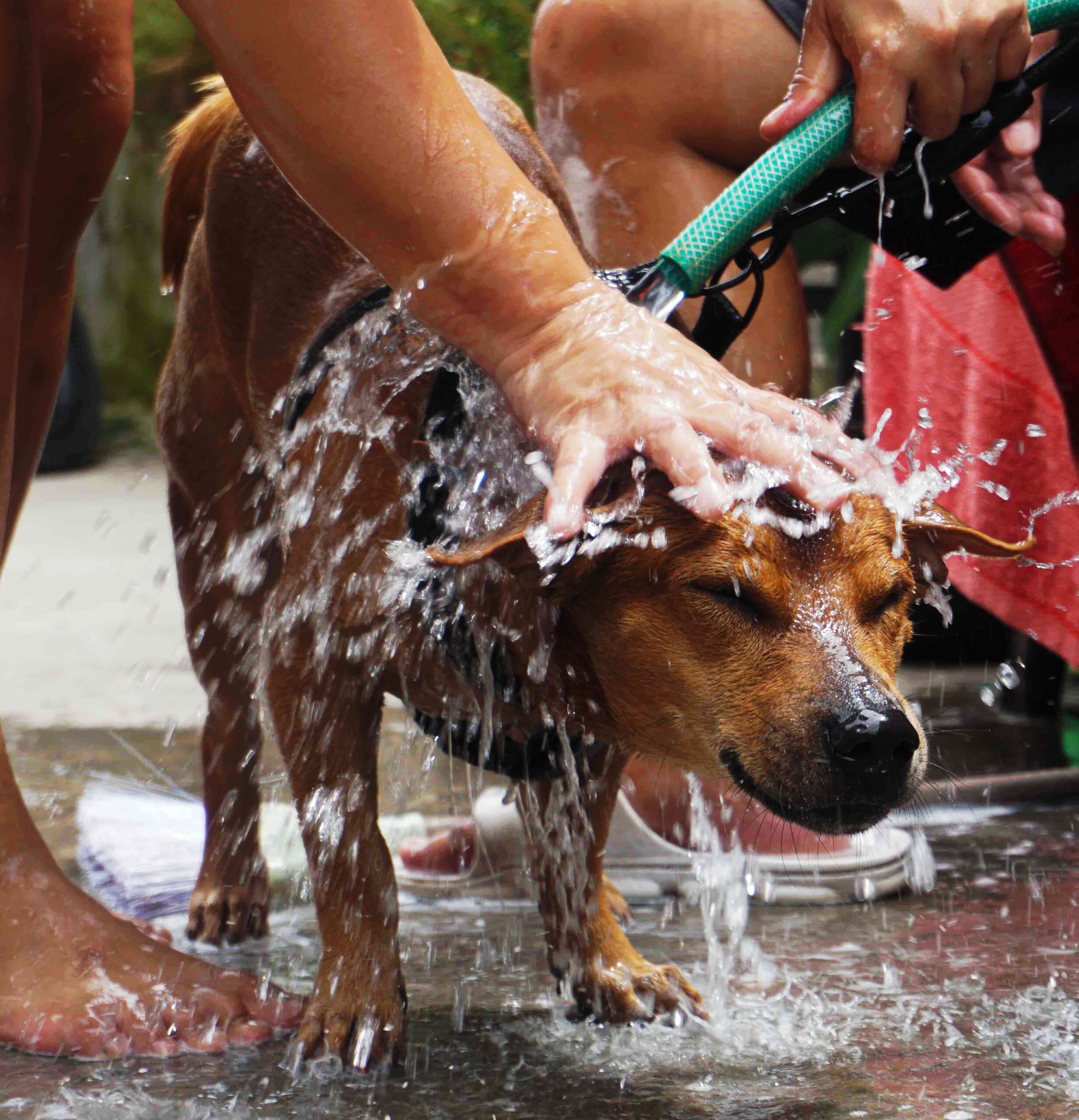
Does Too Much Bathing Harm A Dog’s Coat
The idea that less is more when it comes to grooming your pet has been around for a while. Too much bathing and grooming can dry our pets’ skin, strip away oils, and leave fur looking dull. However, veterinary experts say that’s an old wives’ tale. The truth is that—as long as you use products designed for dogs—too much bathing isn’t a problem. On top of that, frequent bathing has some benefits beyond ensuring your dog smells excellent! So don’t worry about washing Fido too often or too thoroughly; he’ll be just fine.
What About Fleas and Ticks – Does Bathing Help Or Hurt?
If your dog is dealing with fleas or ticks, it might make sense to wash them regularly. Unfortunately, however, many of us don’t realize just how frequent harmful shampoos can be for our furry friends. That’s because regular baths can strip your dog of its natural oils and disrupt its normal skin flora, making it more susceptible to a wide range of health problems. Luckily, there are some things you can do to minimize these risks (including providing extra supplements), but if you want to know more about whether or not you should wash your dog as often as most vets recommend (or even at all), please check out What About Fleas and Ticks – Does Bathing Help Or Hurt? Above!
What If My Dog Has An Allergy To Shampoo?
Allergies in dogs can be just as common as they are in humans. If your dog seems to constantly be scratching, sneezing, or has other allergic symptoms such as red skin, it may indicate an allergen in his environment. Allergic reactions could even come from exposure to grass, pollen, or other allergens that get into your pet’s fur and on his skin. One of these allergens could be something you frequently use without giving it a second thought, like dog shampoo. Luckily, if you think your dog may have an allergy to dog shampoo, you have a few options available for relief.
Can I Use Human Shampoo On My Dog Instead Of A Specialty Pet Shampoo?
Some pet owners choose to use human shampoo on their dogs because they believe it is more gentle. That’s true, but human shampoo won’t lather in dog fur and can easily strip a dog’s coat of its natural oils. However, some shampoos are suitable for both people and pets. To wash your dog without compromising their health or skin, look for a specialty pet shampoo formulated to clean your breed of choice. Pet stores and online retailers sell many types of pet-safe shampoos that can be used on medium to long-haired dogs, as well as shorthaired species.
Which Type Of Soap Is Best For Washing My Dogs – Liquid, Bar-Or Powder?
There are three main types of soap that you can use to wash your dog, liquid, bar, or powder. Many different brands are available today, and not all of them offer a quality product. As with any product you may purchase, it is essential to research before choosing which one is best for you and your pet.
Will Baths Cause Dry Skin In My Pet Or Stain Their Fur?
Most of us assume that a bath is an excellent way to get rid of dog odor and make our pet’s coat nice and shiny. While it’s true that most dogs will smell better after bathing, baths should be given carefully. Baths can strip your pet’s skin of its natural oils, essential for protecting against allergies, bacterial infections, and other health problems. Further, frequent baths can cause dry skin in dogs, leading to yeast or fungal infections. If you have a light-colored dog, regular baths can stain their fur.
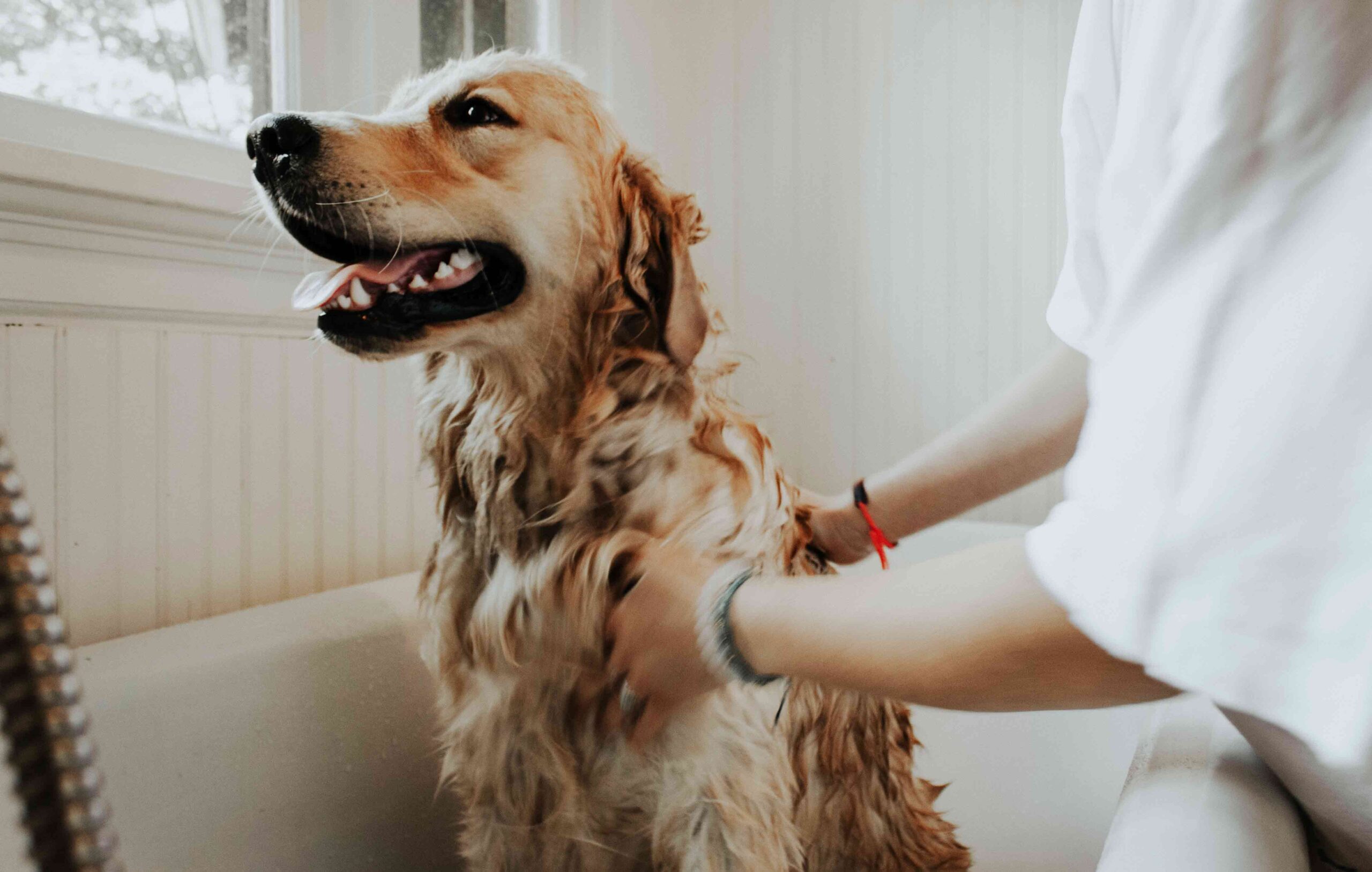
What About Conditioners, Oils, And Other Additives For Pets?
We recommend sticking to plain water and soap. Excessive use of shampoos and conditioners on your pet can strip their skin of its natural oils, which leads to other problems. Oils and additives may help with tangles and fur upkeep, but they can also make your dog stink! That’s not what you want for Fido’s time in public. Just because an ingredient list ends with natural oil doesn’t mean it won’t smell bad. Fats aren’t as easily rinsed off as plain shampoo, meaning residue will be left behind if a little goes a long way. Consider contacting a professional groomer or veterinarian for dogs that need grooming, often for long coats or seasonal shedding, to help keep them clean.
Frequently Asked Questions
The frequency of a dog’s bath will largely depend on its hair type. Dogs with thick, double coats, such as Collies and other long-haired breeds, should be bathed every couple of weeks. There are several ways to go about getting your pet clean: use a detangling brush or conditioner in addition to using your fingers to remove any mats that have formed gently; shampoo her thoroughly all over; rinse her well, and dry her off with a towel before walking her outside for some fresh air and exercise. Alternatively, you can use dog wipes (available at pet stores), which tend to be gentler than shampoos since they leave natural oils intact.
Every dog is a little different. Generally, a wash should happen once a week or at least once a month for itchy dogs and every 2-4 weeks for non-itchy dogs.

